Security law: Hong Kong's artists resist censorship, continue sharing dissident art online 本当にありがとうございます
Yae herself has experienced a similar kind of backlash. A translated version of her manga was reported as “hate speech” on Instagram and was taken down. Objectors said she glorified the protests.
Yae said an emotional burden came with her work. The unrest in Hong Kong has affected her creativity, adding that most of her protest art is driven by anger and confusion.
“I am a very emotional person who likes to use art to process my feelings,” she said. “For me, the process of creating political art is mentally exhausting.”
“Let’s say I need one hour to finish one page of manga. During that one hour, I would feel like I am suffocating in a very dark place because I am carrying these negative feelings into my creation.”
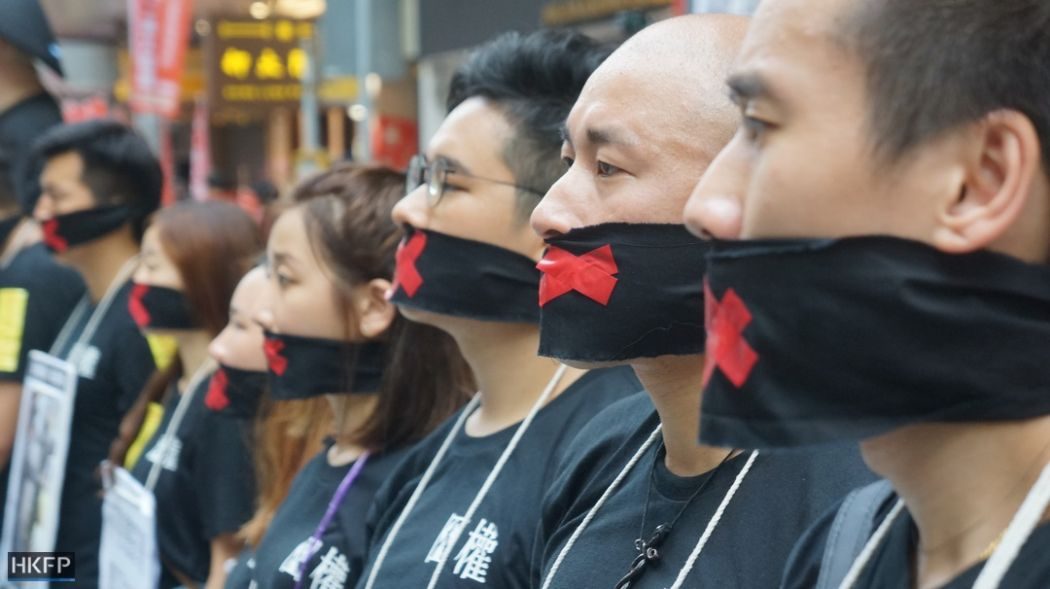
Asked whether she would keep drawing political comics as police enforce the new law, she said previous posts would remain up for now, but she was uncertain about her next steps.
“I can’t imagine what it would be like if I ever get arrested,” she said. “But if I decided to censor myself, I might discourage others from speaking up as well.” Her work has value if it inspires those who are politically disengaged to take action.
Otaku Save Hong Kong
For Cheryl, the Hong Kong she knew has changed drastically over the past year.
“In the past, I could draw whatever I wanted, but now I think we don’t have freedom of expression anymore,” she said. “We are all creating art under the looming shadow of the national security law.”
Cheryl, who declined to give her full name due to the fear of arrest, works in a company IT department. In her spare time, she would attend anime conventions, where she would sell her work to customers. She had the idea of selling protest art in a Japanese manga style to spread awareness.
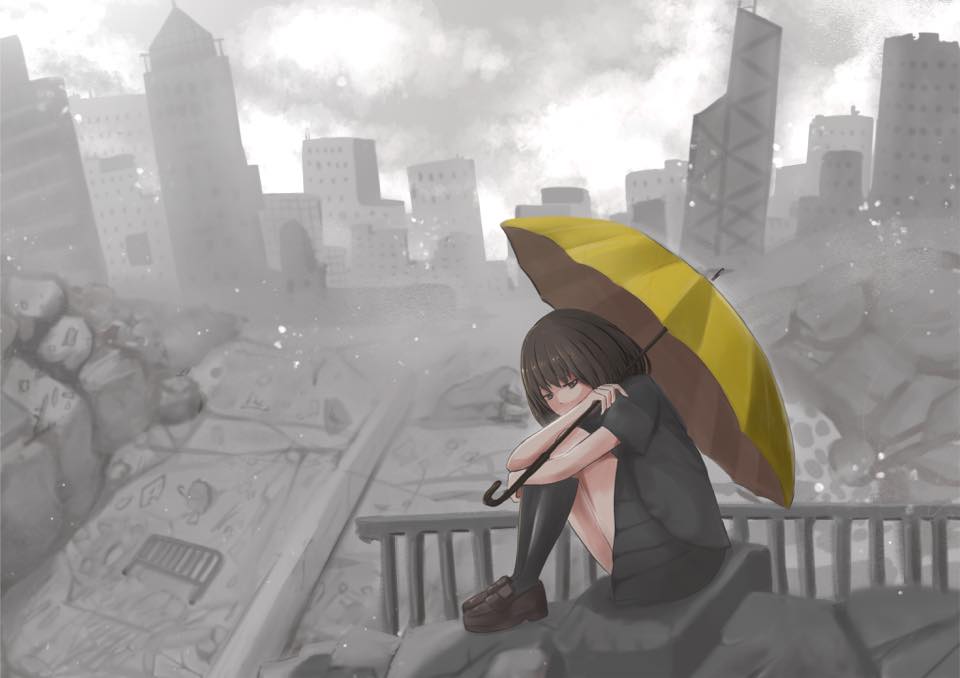
In August last year, she founded Otaku Save Hong Kong, a group of local artists who reflect their support for the pro-democracy movement through art. She said the group aims to send a message to anime fans in both Hong Kong and Japan who are politically disengaged.
The page features work from Yae and other artists. The dialogue is in Chinese, and sometimes in Japanese to help reach an audience there.
Cheryl said artists had agreed to keep publishing protest-related material art as long as they remained anonymous.
“We have all witnessed injustice over the past year, and the new law further proves that Hong Kong does not have judicial independence,” she said.
Cheryl said many protesters consider themselves otakus, although other anime fans often claim that they “don’t care about politics.”
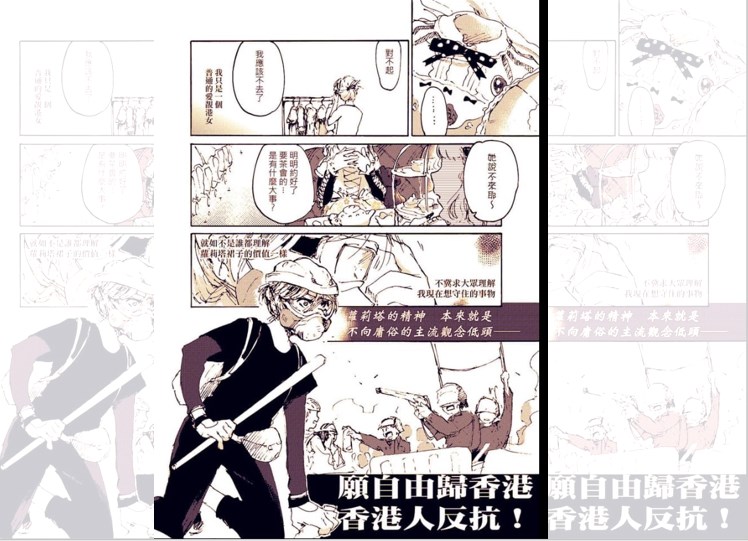
So she collaborated with other members of the group to create a comic about a girl who abandons her hobby as a Lolita fashion girl and becomes a frontline protester.
Lolita fashion is a Japanese subculture inspired by Victorian and Rococo-style clothing. Cheryl said its followers resist pressure to dress in a conventional way.
“And I think this applies to protesters, that we should not surrender to tyranny.”
“If you really like Hong Kong, you should stand up for Hong Kong,” she said. “I hope our platform can inspire them to try a little bit harder when they see us, otakus, advocating for what is right.”
Beijing’s draconian new national security law has sparked a wave of self-censorship on Hong Kong’s social media, with users hastily deleting earlier posts since it came into force on June 30.
Yae, who posts political comic strips, was one of those agonising about what to do. Many friends warned her to be wary of the new law, seen by critics as having a chilling effect on freedom of expression and judicial independence.
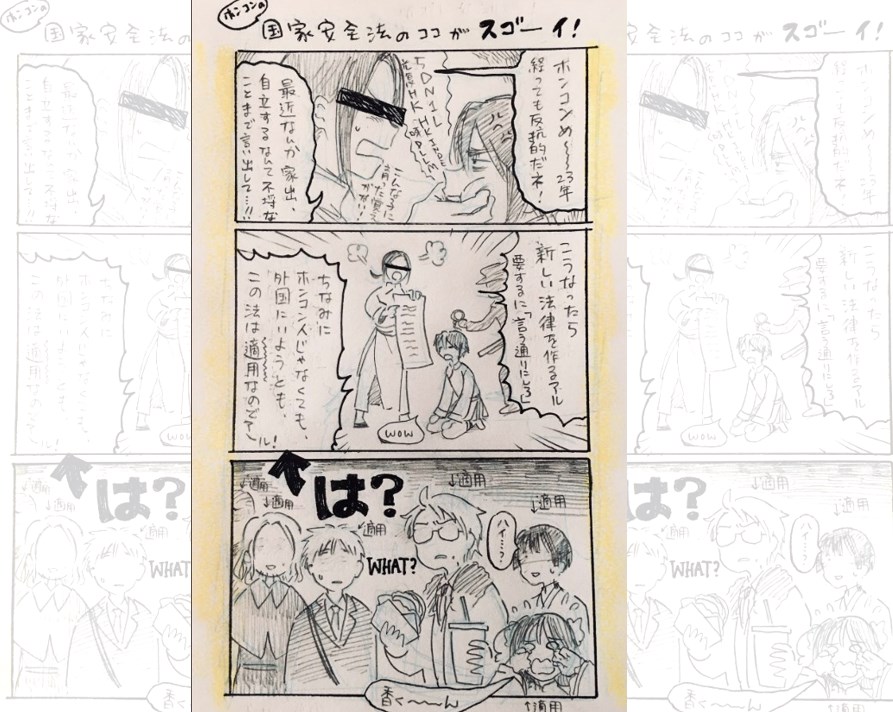
But when she saw people still sharing her artwork, she decided against deletion. Instead, she went the other way and sketched a comic to explain the legislation’s Article 38 to foreigners. The article allows Hongkongers living abroad, and even non-Hong Kong residents, to face prosecution for national security offences committed outside Hong Kong.
“I am not very good at articulating myself,” Yae told HKFP. “That’s why I thought of using manga as a tool to explain what’s happening in Hong Kong, in the hope of raising international awareness.”
In November 2019, Yae published a comic on Twitter depicting how the peaceful movement had become increasingly engulfed in violence, with side notes showing the timeline over three pages. The dialogue was in Japanese for what she described as “political comics designed for Otakus” — people who are fans of Japanese anime, manga, and other popular culture.

Yae chose Japanese as her target audience due to her love for the country. Her ability to read and write the language and her drawing style also made it easier for her to communicate with Japanese netizens.
“I was irritated by the fact that people tend to focus on the violence instead of trying to understand what’s going on,” she said.
Subscribe to HKFP's twice-weekly newsletter for a concise round-up of local news and our best coverage. Unsubscribe at any time - we will not pass on your data to third parties.
Processing… Success! You're on the list. Whoops! There was an error and we couldn't process your subscription. Please reload the page and try again.Her comic has been retweeted more than 230, 000 times, encouraging her to speak up more. Yae had thought her Japanese friends and followers would be annoyed because she was “getting political.” To her surprise, most of the responses were supportive.
Another work of hers, Why We Dislike People from that Country, illustrates the conflict between people in Hong Kong and mainland China. The 30-page manga is based on her observation of “little pinks” – Chinese nationalists who blindly follow the Chinese Communist Party and use social media as a battleground to justify its behaviour.
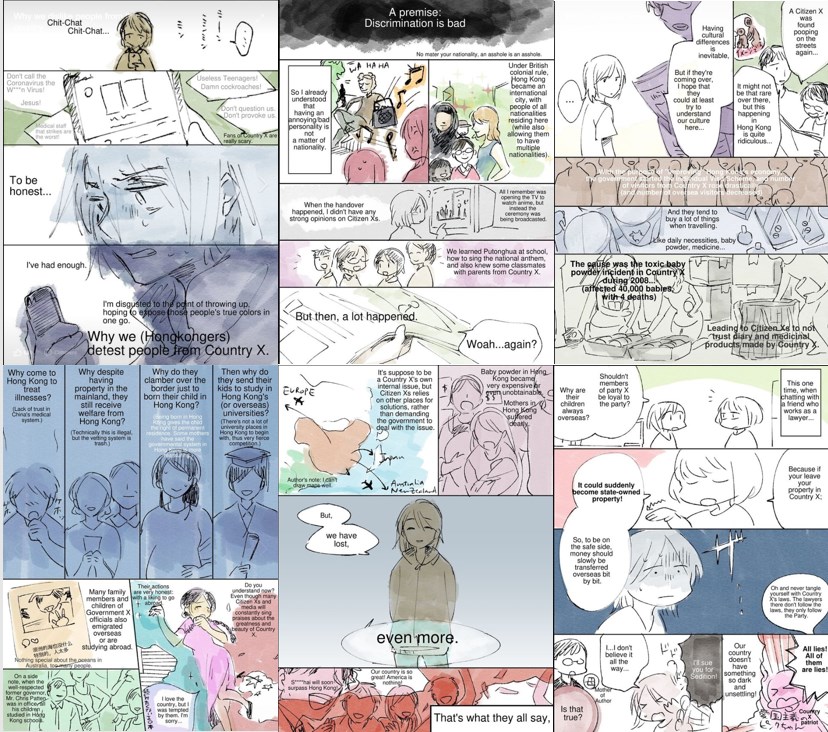
Yae said her comic is based on her personal experience and what she read from the news. The little pinks forcing pro-Beijing ideologies on foreigners while dismissing any form of criticism of the party tarnishes the nation and citizens, she believes.
“I want to approach this sensitive political matter for my readers in a subtle way,” she said. “Although discrimination is not justifiable, Hongkongers’ negative feelings toward pro-Beijing nationalists have slowly developed throughout the decade because they (nationalists) are constantly trying to silence dissenters.”
Japanese artists can face censorship in mainland China. At the end of May, actress Kyoko Koizumi urged people to sign a petition against Hong Kong’s national security law, according to a report by Apple Daily. Koizumi ’s film was subsequently censored on Douban, a social networking platform for movies and book enthusiasts in China.
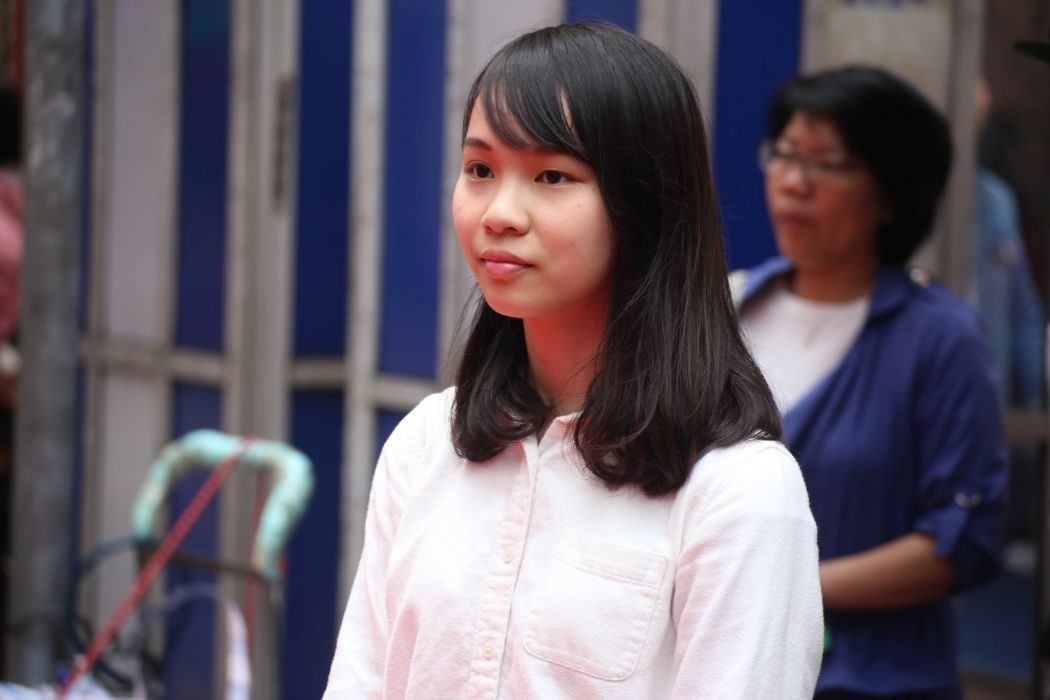
Agnes Chow, a former member of Hong Kong pro-democracy party Demosisto, thanked two reputable Japanese animation directors for standing with Hong Kong on May 17. But her tweet prompted anime fans in China to boycott animation directed by Tsutomu Mizushima and Seiji Mizushima, who have tweeted support for Hongkongers.
Chow was arrested under the national security law earlier this month before being released on bail. Following her detention, “#FreeAgnes” was trending on Japan’s Twitter and received nationwide attention. Japanese politicians and celebrities used the hashtag to virtually protest her arrest. But Hong Kong netizens are predicting that China will censor Japanese artists who show solidarity with Chow.
水島努監督、水島精二監督、
Related articles
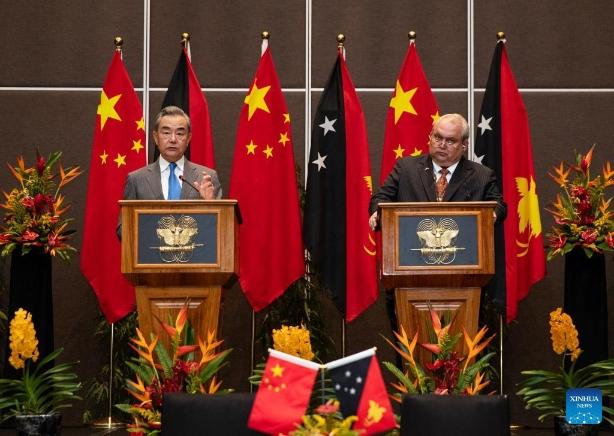 Chinese Foreign Minister Wang Yi, also a member of the Political Bureau of the Communist Party of Ch2024-04-30
Chinese Foreign Minister Wang Yi, also a member of the Political Bureau of the Communist Party of Ch2024-04-30 Contact Us HomeNewsHighlightACWF NewsSocietyWom2024-04-30
Contact Us HomeNewsHighlightACWF NewsSocietyWom2024-04-30
Women Workers in NE China Play Active Role in Various Workplaces
Contact Us HomeNewsHighlightACWF NewsSocietyWom2024-04-30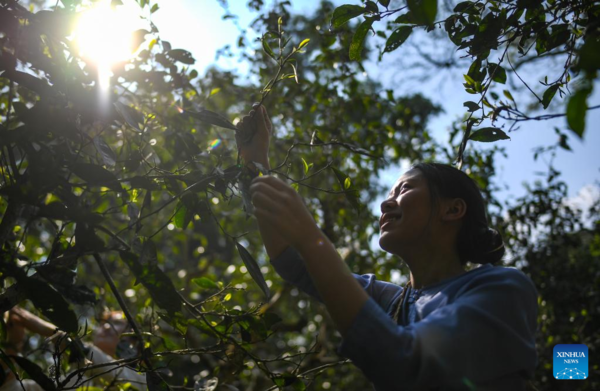
Spring Tea Picking Starts in Pu'er City, China's Yunnan
Contact Us HomeNewsHighlightACWF NewsSocietyWom2024-04-30
Goldman Sachs upbeat on A shares
Goldman Sachs, a global investment banking, securities and investment management firm, sees double-d2024-04-30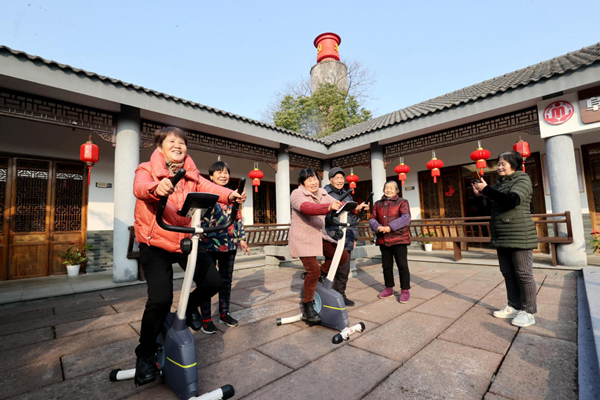
As Population Grays, Average Life Expectancy Rises
Contact Us HomeNewsHighlightACWF NewsSocietyWom2024-04-30

atest comment